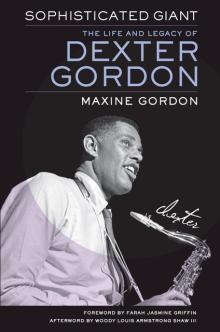
Sophisticated Giant
Sophisticated Giant presents the life and legacy of tenor saxophonist Dexter Gordon (1923–1990), one of the major innovators of modern jazz. In a context of biography, history, and memoir, Maxine Gordon has completed the book that her late husband began, weaving his “solo” turns with her voice and a chorus of voices from past and present. Reading like a jazz composition, the blend of research, anecdote, and a selection of Dexter’s personal letters reflects his colorful life and legendary times. It is clear why the celebrated trumpet genius Dizzy Gillespie said to Dexter, “Man, you ought to leave your karma to science.”
Dexter Gordon the icon is the Dexter beloved and celebrated on albums, on film, and in jazz lore--even in a street named for him in Copenhagen. But this image of the cool jazzman fails to come to terms with the multidimensional man full of humor and wisdom, a figure who struggled to reconcile being both a creative outsider who broke the rules and a comforting insider who was a son, father, husband, and world citizen. This essential book is an attempt to fill in the gaps created by our misperceptions as well as the gaps left by Dexter himself.
Presented in partnership with the Greater Madison Jazz Consortium, the UW-Madison School of Music, and the UW-Madison Department of Afro-American Studies.
Maxine Gordon

Maxine Gordon is an independent scholar with a lifetime career working with Jazz musicians. As an oral historian and archivist in the fields of Jazz and African American cultural history, her book, Sophisticated Giant: The Life and Legacy of Dexter Gordon (University of California Press, 2018) fulfills the promise she made to her late husband, Jazz saxophonist and Academy Award nominated actor Dexter Gordon, to complete his biography.
She is currently working on her next book, Quartette: Four Women in Jazz, Stories from the Lives of Maxine Sullivan, Velma Middleton, Melba Liston, and Shirley Scott (African Diaspora, Past/Present/Future, Howard University Press and Columbia University Press). The project will give voice to four Jazz musicians who can inspire the future and inform the study of the past. Archival research searching interviews and recordings will be pursued in order to incorporate the artists’ voices in the work.
